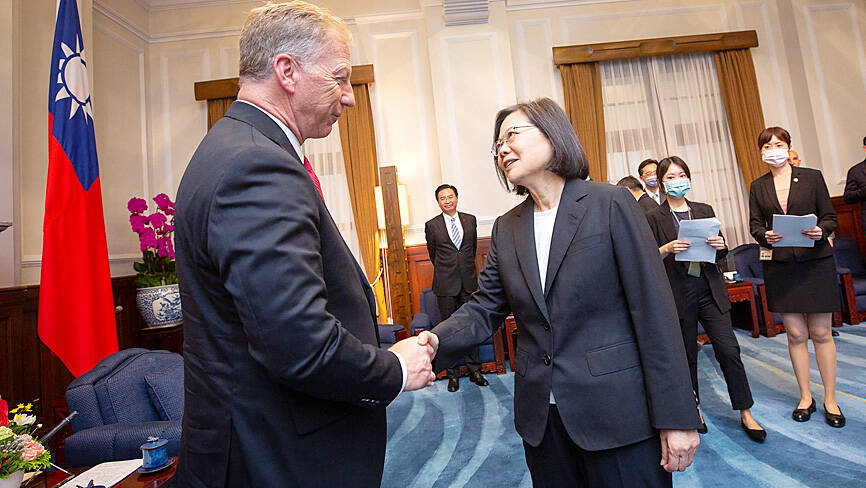Visiting US Representative Kevin Hern during a meeting with President Tsai Ing-wen (蔡英文) yesterday said he hopes to see Taiwan as an independent country one day.
Hern is leading a delegation of US lawmakers from the US Republican Study Committee (RSC), of which he is the chairman.
The group is to stay until tomorrow.

Photo: Reuters
“Support for Taiwan as an independent and sovereign nation has been one of the founding principles of the RSC and has remained a top priority for 50 years,” he said.
As the US celebrated its Independence Day yesterday, Hern said: “What an honor it would be to one day soon see Taiwan experience the same independence that our original 13 colonies enjoyed in the early days.”
He thanked Taiwanese for “wanting the liberties and freedoms that can only be truly experienced as an independent nation.”
He acknowledged the leadership of Representative to the US Hsiao Bi-khim (蕭美琴), saying the Taipei Economic and Cultural Representative Office in the US “is truly an amazing example of the hard work and commitment that is synonymous with the culture of Taiwan.”
The relationship between Taiwan and the US enjoys support across the political spectrum, and “all Americans of all walks of life understand the importance of our friendship,” Hern said.
Tsai thanked Hern for arranging the visit and promoting exchanges between Taiwan and the US.
Taiwan plays a vital role in the global supply chain and hopes to work with the US and other democratic partners to make it safer and more resilient, she said.
Tsai expressed the hope that Taiwan and the US would soon sign an agreement on the avoidance of double taxation, following the signing of the first agreement under the US-Taiwan Initiative on 21st-Century Trade last month.
Earlier yesterday, the delegation met with Vice President William Lai (賴清德), who thanked delegation members for showing support for Taiwan through the visit.
Lai said he hoped that the committee can support Taiwan’s bid to join the Comprehensive and Progressive Agreement for Trans-Pacific Partnership, which would be beneficial to the economic development of Taiwan and the whole region.
Taiwan has been bolstering its national defense capabilities and hopes that the US would continue to provide the nation with the weapons necessary for the nation to defend itself, he said, adding that he also hopes the weapons would be delivered on time.
Separately, eight Canadian lawmakers arrived in Taiwan yesterday for a six-day visit, the Ministry of Foreign Affairs said in a statement.
The members of the delegation, which is led by Deputy Leader of the Canadian Conservative Party Melissa Lantsman, belong to major political parties and serve in important parliamentary committees, the ministry said.
As China continues to take unilateral actions to escalate regional tensions, the visit “fully demonstrates the Canadian parliament’s firm support for Taiwan,” it said.
Through the trip, the delegation would gain a better understanding of the situation in Taiwan and in the region, which can help improve the partnership between Taiwan and the Canadian parliament, it added.

DAREDEVIL: Honnold said it had always been a dream of his to climb Taipei 101, while a Netflix producer said the skyscraper was ‘a real icon of this country’ US climber Alex Honnold yesterday took on Taiwan’s tallest building, becoming the first person to scale Taipei 101 without a rope, harness or safety net. Hundreds of spectators gathered at the base of the 101-story skyscraper to watch Honnold, 40, embark on his daredevil feat, which was also broadcast live on Netflix. Dressed in a red T-shirt and yellow custom-made climbing shoes, Honnold swiftly moved up the southeast face of the glass and steel building. At one point, he stepped onto a platform midway up to wave down at fans and onlookers who were taking photos. People watching from inside

A Vietnamese migrant worker yesterday won NT$12 million (US$379,627) on a Lunar New Year scratch card in Kaohsiung as part of Taiwan Lottery Co’s (台灣彩券) “NT$12 Million Grand Fortune” (1200萬大吉利) game. The man was the first top-prize winner of the new game launched on Jan. 6 to mark the Lunar New Year. Three Vietnamese migrant workers visited a Taiwan Lottery shop on Xinyue Street in Kaohsiung’s Gangshan District (崗山), a store representative said. The player bought multiple tickets and, after winning nothing, held the final lottery ticket in one hand and rubbed the store’s statue of the Maitreya Buddha’s belly with the other,

‘COMMITTED TO DETERRENCE’: Washington would stand by its allies, but it can only help as much as countries help themselves, Raymond Greene said The US is committed to deterrence in the first island chain, but it should not bear the burden alone, as “freedom is not free,” American Institute in Taiwan Director Raymond Greene said in a speech at the Institute for National Defense and Security Research’s “Strengthening Resilience: Defense as the Engine of Development” seminar in Taipei yesterday. In the speech, titled “Investing Together and a Secure and Prosperous Future,” Greene highlighted the contributions of US President Donald Trump’s administration to Taiwan’s defense efforts, including the establishment of supply chains for drones and autonomous systems, offers of security assistance and the expansion of

STREAMLINED: The dedicated funding would allow the US to transfer equipment to Taiwan when needed and order upgraded replacements for stockpiles, a source said The US House of Representatives on Thursday passed a defense appropriations bill totaling US$838.7 billion, of which US$1 billion is to be allocated to reinforcing security cooperation with Taiwan and US$150 million to replace defense articles provided to the nation. These are part of the Consolidated Appropriation Act, which the US House yesterday passed with 341 votes in favor and 88 against. The act must be passed by the US Senate before Friday next week to avoid another government shutdown. The US House Committee on Appropriations on Monday unveiled the act, saying that it allocates US$1 billion for the Taiwan Security Cooperation Initiative